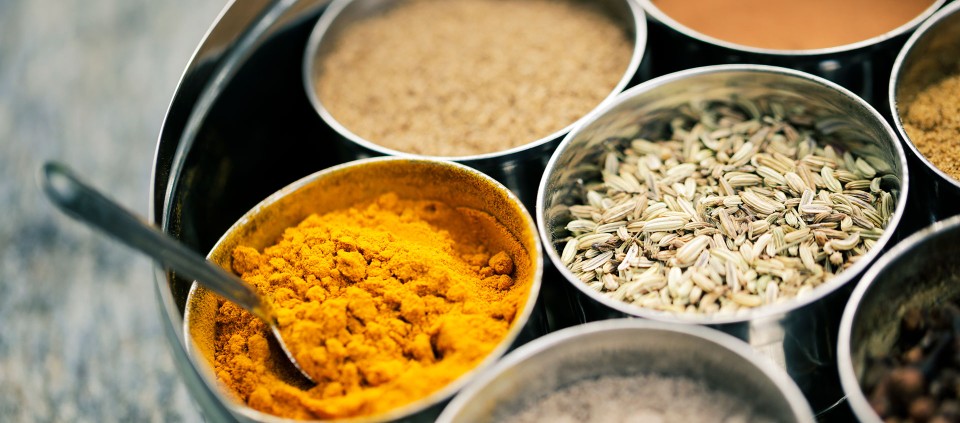Kripalu Recipe: Savory Spice Blend

Jazz up your meals with a savory spice blend. Keep a jar on hand to sprinkle over roasted veggies, add to marinades and salad dressings, cook in rice or kitchari, and transform your evening popcorn into a truly magical experience.
Why spices? Ayurveda advises incorporating herbs and spices into dishes not only because they make food taste stellar, but also because they are highly medicinal. When you familiarize yourself with the impressive health benefits of each spice, your spice rack turns into a medicine cabinet overnight.
The Savory Spice blend is comprised of cumin, coriander, fennel, turmeric, ginger, and pippali. Let’s take a look at the merits of each spice, according to Ayurveda.
Cumin is one the top herbs for abating sluggish digestion. If you find that you often feel heavy after eating, or are simply not hungry, cumin could be your savior. Cumin also helps aid in the absorption of nutrients. This is a perfect spice to incorporate if you tend towards gas, bloating, and gurgling in your gut. In addition, this powerful seed can be used to treat some skin and blood disorders. Cumin is also known to absorb some of the liquid in the colon, thereby offering relief for diarrhea and loose stools.
Coriander, like cumin, is used to vanquish gas and bloating. It helps foster a healthy urinary system, works to simulate the liver, and can be used to treat intestinal parasites.
Fennel is anti-flatulent, which is why you often see a bowl of sugar-coated fennel seeds perched on the counter at Indian restaurants. Fennel can help with nausea and cramps; it’s the main ingredient in gripe water, a tonic used for colicky babies. Cooling in nature, fennel can alleviate excess heat or acidity in the body.
Turmeric has gained in popularity over the last decade for its numerous health benefits, such as its anti-inflammatory properties and ability to regulate blood sugar. Some lesser-known benefits include alleviating mucus conditions and fighting intestinal infections. Turmeric increases digestive fire and also helps burn up stored toxins. Due to its blood-purifying nature, it has a cleansing effect on the liver and blood, supporting healthy, radiant, and clear skin. Turmeric is a natural antibiotic; in fact, in India, Band-Aids are frequently coated with a layer of turmeric to accelerate the healing process. Turmeric is also thought to prevent colon cancer. Many recent studies have looked at the impact of curcumin—a compound contained in turmeric—on colorectal cancer. The incidents of this type of cancer are surprisingly low in India, and experts believe that might be because turmeric is a staple in Indian cuisine.
Ginger works beautifully to warm the digestive system, encouraging the release of digestive enzymes. Often used to pacify post-operative nausea, morning sickness, and carsickness, ginger is a great spice to have on hand. Due to its heating nature, ginger can help to clear colds and lung congestion. Finally, ginger can be used for abdominal pains, such as menstrual cramps.
Pippali, a close relative to black pepper, acts like jet fuel on your digestive system. Incredibly stimulating, pippali is commonly used to treat the respiratory system and rejuvenate the lungs. It also supports and strengthens reproductive functions, and increases the absorption and assimilation of nutrients.
Ready to supercharge your food? Here’s the recipe.
1 tablespoon cumin powder
2 tablespoons coriander powder
1 tablespoon fennel powder
1 tablespoon turmeric powder
2 teaspoons ginger powder
1 teaspoon pippali (long pepper) powder
Mix all ingredients in an airtight jar. Shake until well blended.